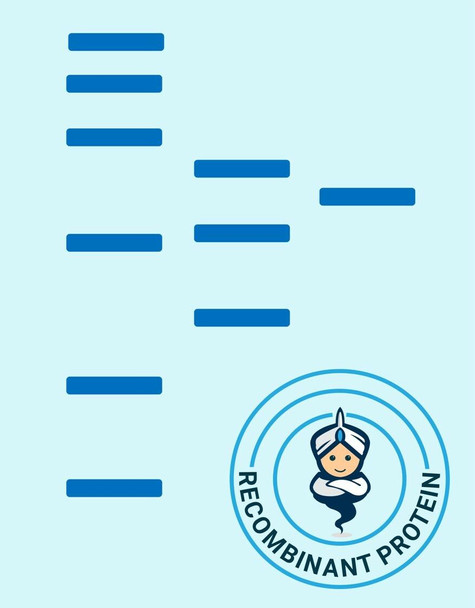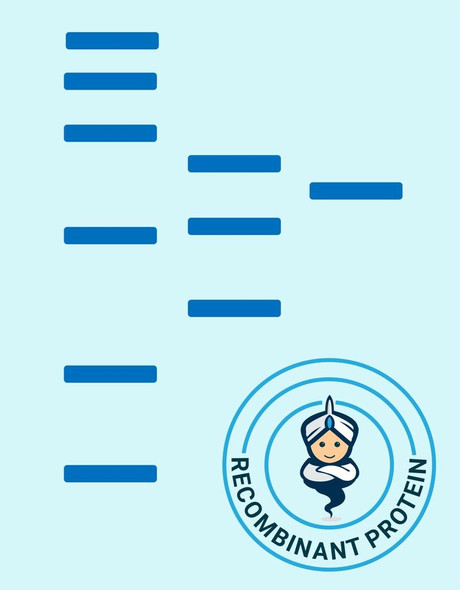Enzymes Recombinant Proteins
Human KIT Recombinant Protein (RPPB2559)
- SKU:
- RPPB2559
- Product Type:
- Recombinant Protein
- Species:
- Human
- Uniprot:
- P10721
- Research Area:
- Enzymes
Description
| Product Name: | Human KIT Recombinant Protein |
| Product Code: | RPPB2559 |
| Size: | 10µg |
| Species: | Human |
| Target: | KIT |
| Synonyms: | Mast/stem cell growth factor receptor Kit, SCFR, Piebald trait protein, PBT, Proto-oncogene c-Kit, Tyrosine-protein kinase Kit, p145 c-kit, v-kit Hardy-Zuckerman 4 feline sarcoma viral oncogene homolog, CD117. |
| Source: | Sf9 Insect cells |
| Physical Appearance: | Sterile Filtered colorless solution. |
| Formulation: | KIT protein solution (0.25mg/ml) contains Phosphate Buffered Saline (pH 7.4) and 10% glycerol. |
| Stability: | Store at 4°C if entire vial will be used within 2-4 weeks.Store, frozen at -20°C for longer periods of time. For long term storage it is recommended to add a carrier protein (0.1% HSA or BSA).Avoid multiple freeze-thaw cycles. |
| Purity: | Greater than 90.0% as determined by SDS-PAGE. |
| Amino Acid Sequence: | QPSVSPGEPS PPSIHPGKSD LIVRVGDEIR LLCTDPGFVK WTFEILDETN ENKQNEWITE KAEATNTGKY TCTNKHGLSN SIYVFVRDPA KLFLVDRSLY GKEDNDTLVR CPLTDPEVTN YSLKGCQGKP LPKDLRFIPD PKAGIMIKSV KRAYHRLCLH CSVDQEGKSV LSEKFILKVR PAFKAVPVVS VSKASYLLRE GEEFTVTCTI KDVSSSVYST WKRENSQTKL QEKYNSWHHG DFNYERQATL TISSARVNDS GVFMCYANNT FGSANVTTTL EVVDKGFINI FPMINTTVFV NDGENVDLIV EYEAFPKPEH QQWIYMNRTF TDKWEDYPKS ENESNIRYVS ELHLTRLKGT EGGTYTFLVS NSDVNAAIAF NVYVNTKPEI LTYDRLVNGM LQCVAAGFPE PTIDWYFCPG TEQRCSASVL PVDVQTLNSS GPPFGKLVVQ SSIDSSAFKH NGTVECKAYN DVGKTSAYFN FAFKGNNKEQ IHPHTLFTPL EHHHHHH |
KIT, also known as KIT Proto-Oncogene Receptor Tyrosine, is a cytokine receptor which is expressed not only in hematopoietic stem cells but likewise in other cell types. KIT binds to receptor tyrosine kinase type III, which is a stem cell factor, also named a "rigid factor" or "c-kit ligand". Once this receptor binds to stem cell factor (SCF), it forms a dimer which activates intrinsic tyrosine kinase activity, which sequentially phosphorylates & activates signaling molecules which breed signals in cells. This receptor protects vascular smooth muscle cells from apoptosis in addition to restoring cardiac function after myocardial infarction.
KIT produced in Sf9 Insect cells is a single, glycosylated polypeptide chain containing 507 amino acids (26-524 a.a.) and having a molecular mass of 57.1kDa (Molecular size on SDS-PAGE will appear at approximately 50-70kDa).KIT is expressed with an 8 amino acid His tag at C-Terminus and purified by proprietary chromatographic techniques.
| UniProt Protein Function: | Kit: a receptor tyrosine kinase and a member of the subfamily that includes PDGF, CSF-1 and FLT-3/flk-2 receptors. Receptor for stem cell factor. Plays a critical role in hematopoietic stem cell, mast cell, melanocyte and germ cell development. Ligand binding induces autophosphorylation, dimerization and activation, leading to the recruitment and phosphorylation of downstream SH2-containing signaling components including PLC-gamma, PI3 kinase p85, SHP2 and CrkL, linking c-Kit to various cell signaling pathways. Molecular lesions that impair the kinase activity of c-Kit are associated with a variety of developmental disorders, while mutations that constitutively activate c-Kit can lead to hyperplasia and tumorigenesis. Activating mutations cause >90% of gastrointestinal stromal tumors (GIST); successfully treated with inhibitors Gleevec (imatinib, Glivec) and Sutent (Sutinib, SU11248). Activating mutations also induce mastocytosis. Autocrine/paracrine stimulation may drive some lung and other tumors. Loss of expression associated with melanoma progression. Familial loss of function mutations cause piebaldism, with defects in hair and skin pigmentation due to lack of melanocytes. |
| UniProt Protein Details: | Protein type:EC 2.7.10.1; Protein kinase, TK; Protein kinase, tyrosine (receptor); Kinase, protein; Oncoprotein; Membrane protein, integral; TK group; PDGFR family Chromosomal Location of Human Ortholog: 4q12 Cellular Component: extracellular space; internal side of plasma membrane; mast cell granule; integral to membrane; acrosome; plasma membrane; intercellular junction; external side of plasma membrane Molecular Function:protein binding; protein homodimerization activity; protease binding; cytokine binding; metal ion binding; protein-tyrosine kinase activity; stem cell factor receptor activity; transmembrane receptor protein tyrosine kinase activity; receptor signaling protein tyrosine kinase activity; ATP binding Biological Process: nerve growth factor receptor signaling pathway; activation of MAPK activity; somatic stem cell maintenance; germ cell programmed cell death; positive regulation of JAK-STAT cascade; lymphoid progenitor cell differentiation; positive regulation of long-term neuronal synaptic plasticity; positive regulation of tyrosine phosphorylation of Stat3 protein; regulation of cell shape; epithelial cell proliferation; germ cell migration; somatic stem cell division; erythrocyte differentiation; T cell differentiation; fibroblast growth factor receptor signaling pathway; mast cell chemotaxis; embryonic hemopoiesis; stem cell differentiation; detection of mechanical stimulus involved in sensory perception of sound; positive regulation of phosphoinositide 3-kinase cascade; positive regulation of tyrosine phosphorylation of Stat1 protein; immature B cell differentiation; regulation of pigmentation during development; glycosphingolipid metabolic process; positive regulation of transcription factor activity; mast cell cytokine production; peptidyl-tyrosine phosphorylation; protein amino acid autophosphorylation; signal transduction; ovarian follicle development; positive regulation of MAPKKK cascade; myeloid progenitor cell differentiation; melanocyte differentiation; positive regulation of cell proliferation; negative regulation of programmed cell death; visual learning; hemopoiesis; inflammatory response; positive regulation of Notch signaling pathway; lamellipodium biogenesis; epidermal growth factor receptor signaling pathway; phosphoinositide-mediated signaling; dendritic cell cytokine production; cytokine and chemokine mediated signaling pathway; male gonad development; stem cell maintenance; positive regulation of phosphoinositide 3-kinase activity; mast cell degranulation; regulation of cell proliferation; positive regulation of pseudopodium formation; positive regulation of tyrosine phosphorylation of Stat5 protein; gut development; pigmentation; actin cytoskeleton reorganization; innate immune response; spermatogenesis; spermatid development; positive regulation of cell migration Disease: Gastrointestinal Stromal Tumor; Mast Cell Disease; Piebald Trait; Testicular Germ Cell Tumor |
| NCBI Summary: | This gene encodes the human homolog of the proto-oncogene c-kit. C-kit was first identified as the cellular homolog of the feline sarcoma viral oncogene v-kit. This protein is a type 3 transmembrane receptor for MGF (mast cell growth factor, also known as stem cell factor). Mutations in this gene are associated with gastrointestinal stromal tumors, mast cell disease, acute myelogenous lukemia, and piebaldism. Multiple transcript variants encoding different isoforms have been found for this gene. [provided by RefSeq, Jul 2008] |
| UniProt Code: | P10721 |
| NCBI GenInfo Identifier: | 125472 |
| NCBI Gene ID: | 3815 |
| NCBI Accession: | P10721.1 |
| UniProt Secondary Accession: | P10721,Q6IQ28, Q99662, Q9UM99, B5A956, D5LXN2, D5M931 F5H8F8, |
| UniProt Related Accession: | P10721 |
| Molecular Weight: | |
| NCBI Full Name: | Mast/stem cell growth factor receptor Kit |
| NCBI Synonym Full Names: | v-kit Hardy-Zuckerman 4 feline sarcoma viral oncogene homolog |
| NCBI Official Symbol: | KIT�� |
| NCBI Official Synonym Symbols: | PBT; SCFR; C-Kit; CD117�� |
| NCBI Protein Information: | mast/stem cell growth factor receptor Kit; p145 c-kit; proto-oncogene c-Kit; piebald trait protein; soluble KIT variant 1; tyrosine-protein kinase Kit; proto-oncogene tyrosine-protein kinase Kit; v-kit Hardy-Zuckerman 4 feline sarcoma viral oncogene-like protein |
| UniProt Protein Name: | Mast/stem cell growth factor receptor Kit |
| UniProt Synonym Protein Names: | Piebald trait protein; PBT; Proto-oncogene c-Kit; Tyrosine-protein kinase Kit; p145 c-kit; v-kit Hardy-Zuckerman 4 feline sarcoma viral oncogene homolog; CD_antigen: CD117 |
| Protein Family: | Mast/stem cell growth factor receptor |
| UniProt Gene Name: | KIT�� |
| UniProt Entry Name: | KIT_HUMAN |






